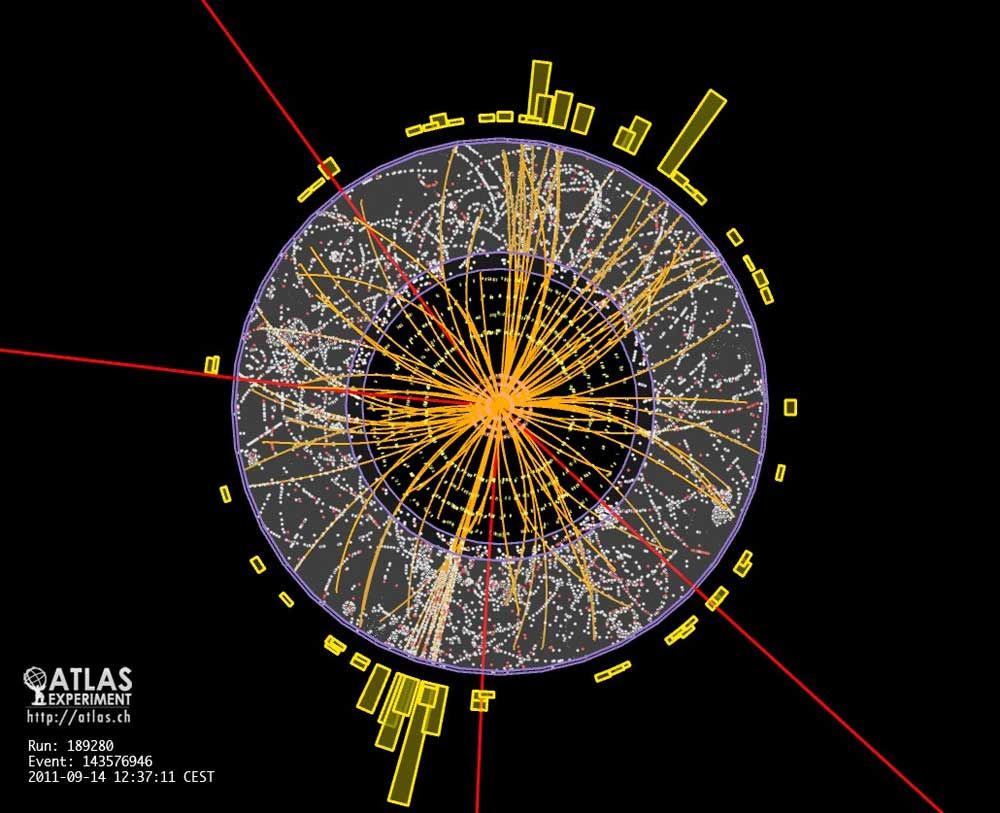What Should 'God Particle' Be Renamed? Physicists Weigh In

Physicists love the Higgs boson, but they hate the God particle.
The elusive Higgs particle, which scientists at the Large Hadron Collider (LHC) particle accelerator announced Tuesday (Dec. 13) that they are closing in on, is popularly known as the "God particle."
The moniker, beloved by the press, is almost universally despised by experts who study particle physics.
"I detest the name 'God particle,'" Vivek Sharma, a physicist at the University of California, San Diego, and the leader of the Higgs search at LHC's CMS experiment, wrote in an email. "I am not particularly religious, but I find the term an 'in your face' affront to those who [are]. I do experimental physics not GOD."
Other physicists vehemently agreed. [Gallery: Search for the Higgs Boson]
"It's an awful name," Michio Kaku, a theoretical physicist at the City College of New York, told LiveScience. "It does not convey the particle's true role, that it is the last missing piece of the Standard Model, and that it gives mass to the other particles."
Some physicists said a new nickname may be in order. They, along with LiveScience's Facebook fans, have offered up ideas, which range from "masson" and "OOM" like the Buddhist chant, to "Super Cool Non-Denominational Particle." Of course, others think "Higgs boson" works just fine.
Sign up for the Live Science daily newsletter now
Get the world’s most fascinating discoveries delivered straight to your inbox.
Origin of the term
The Standard Model is the physics theory that describes nature's tiniest building blocks. Every particle included in the theory, except for the Higgs boson, has been detected experimentally.
On Tuesday, LHC physicists at the CERN laboratory in Geneva, Switzerland, reported their latest findings in the search for the Higgs, which indicate some preliminary hints that it is being created inside the atom smasher. The particle is thought to be associated with a field that is responsible for giving other particles their mass.
Much of the media coverage of the announcement included the term "God particle," which originated in the title of a 1994 book by Nobel-winning physicist Leon Lederman. The story goes that Lederman originally wanted to name the tome "The Goddamn Particle" because of how difficult it was to detect, but was persuaded by his publisher, Delta, to shorten it.
"It's a pity that Leon Lederman, otherwise a nice enough fellow, chose to go ahead with this moniker at the advice of his publishing agents to sell more books," Sharma said.
However, ever since the book came out, the Higgs boson hasn't been able to escape the nickname, at least in popular discourse.
"I feel the term 'God particle,' invented by a publisher to sell books and make money, insultingly misrepresents both science and religion," Rutgers University physicist Matt Strassler wrote in an email.
Sacrilegious
Many of the strongest objections to the name come because of its religious bent.
The name "carries almost no information about why the Higgs particle is important, it makes physicists sound pompous and arrogant, and it reinforces a very harmful presumption that physicists are trying to replace or compete with 'God,'" New York University physicist Kyle Cranmer wrote in an email to LiveScience. "In reality, physicists cover the full range from devotee to atheist. Physicists are generally driven to understand how nature works — as 'natural philosophers' we appreciate the beauty of its order and its chaos, perhaps more than most."
And ultimately, researchers say the term "God particle" simply doesn't fit the Higgs boson's actual characteristics.
"'God particle' is a bad name, in every way," wrote University of Michigan physicist Gordon Kane. "It has nothing to do with the physics. Most (all?) physicists dislike it."
However, hatred of the term isn't universal.
"It's a catchy name, so why not? :)" wrote Brown University physicist Greg Landsberg.
A new name?
In lieu of such a controversial nickname, many physicists didn't hesitate to offer alternative suggestions for a popular label.
"One possibility is the OOM particle (after the Buddhist chant, that is supposed to take you to Nirvana)," offered Kaku. "OOM for Origin of Mass particle."
Others also focused on the Higgs' role in bestowing mass.
"Why not the 'mass particle?'" suggested Boston University physicist Lawrence Sulak. "Or since it is a bosON, like the photON or the gluON, it could be called the 'masson.' Let your imagination go wild, 'stickyon,' 'inertiaon,' 'weighton.'"
But many physicists expressed their satisfaction with the simple term "Higgs boson," after Peter Higgs, the leader of the group that first theorized the particle in 1964.
"It is all very well for us to bemoan the 'God Particle' and say how much better the 'humongous space kablouie' is than the 'big bang,' but I don't think we will find better words than the 'Higgs boson,'" said CERN physicist William Murray.
Perhaps all the "Higgs boson" term needs is a friendly adjective or two around it. Strassler proposed referring to the subatomic particle as "the evanescent yet essential Higgs boson."
LiveScience readers also offered a fount of good ideas via Facebook, including the "Vague Existo Particle" from Scott Dunn, the "Super Cool Non-Denominational Particle" from Amanda Callaghan, or the "Shy Particle,'' since it's so hard to find, from Jitesh Ahuja.
Or, a new moniker could make a nod to the $10 billion price tag of the LHC.
"Maybe we should call it the "Billion" to remind us how much it cost to find the damn thing :-)" Cranmer wrote.
You can follow LiveScience senior writer Clara Moskowitz on Twitter @ClaraMoskowitz. Follow LiveScience for the latest in science news and discoveries on Twitter @livescience and on Facebook.
